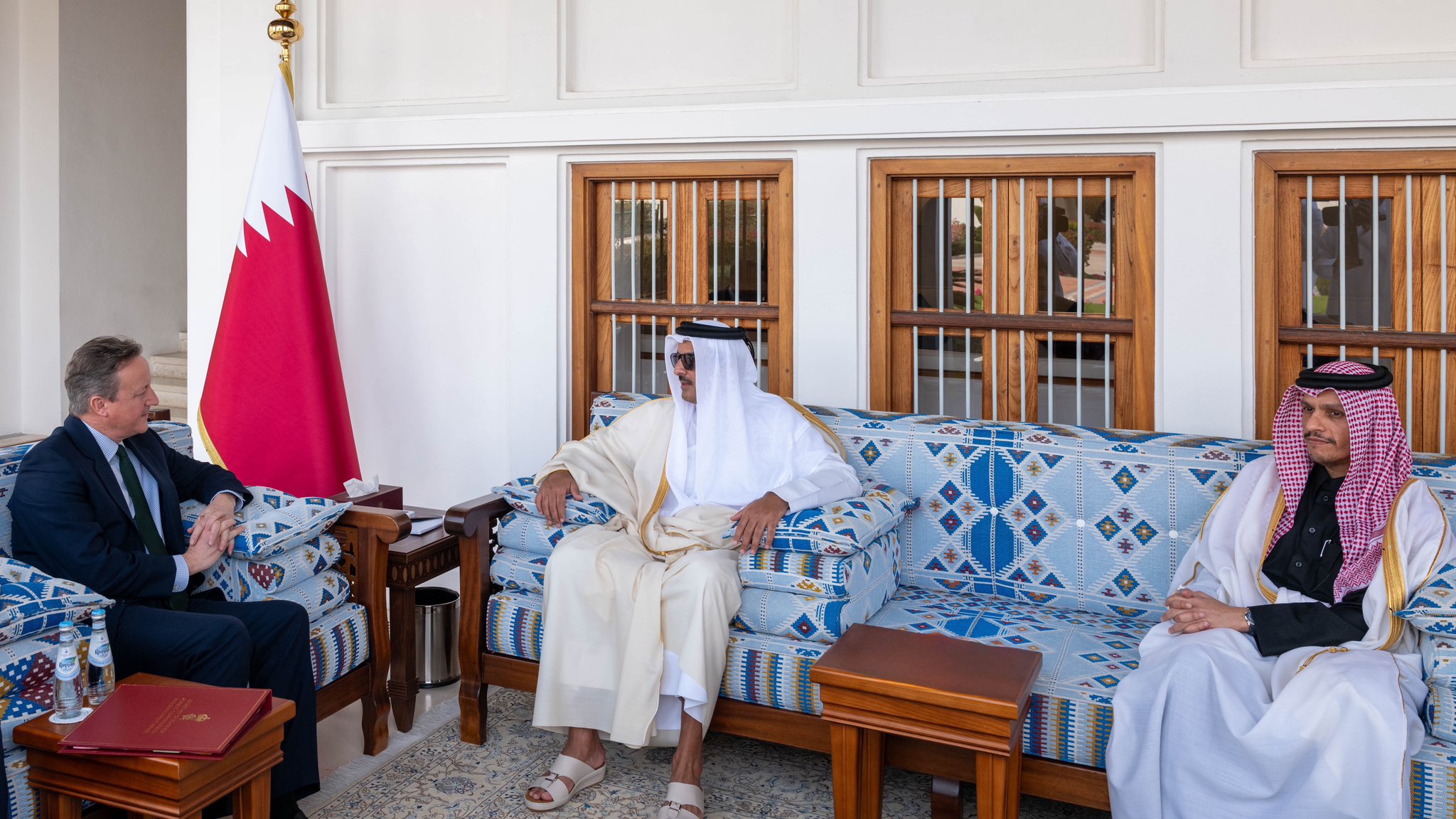The British official’s visit is part of a regional tour that included the West Bank and Tel Aviv, more than 100 days since the beginning of the brutal Israeli onslaught in Gaza.
Qatar and the United Kingdom have joined efforts to deliver aid to Gaza with the launch of the first joint delivery taking place on Thursday, the British government announced in a statement during the visit of Foreign Secretary David Cameron.
Cameron, who visited Doha on Thursday, witnessed the loading of 17 tonnes of tents at the Al Udeid Military Base before it departed the country for Egypt’s El Arish before entering Gaza.
“The scale of suffering in Gaza is unimaginable. More must be done, faster, to help people trapped in this desperate situation. We have trebled our assistance for Gaza, and cooperation with partners like Qatar is helping move life-saving aid and equipment over the border to those living in devastation,” Cameron said, as quoted by the UK government.
Cameron met Qatar’s Amir Sheikh Tamim bin Hamad Al Thani as well as Qatar’s Prime Minister and Foreign Minister Sheikh Mohammed bin Abdulrahman Al-Thani in Doha on the same day.
The British official’s visit is part of a regional tour that included the West Bank and Tel Aviv, more than 100 days since the beginning of the brutal Israeli onslaught in Gaza.
Aid and the release of the remaining 136 captives from Hamas in Gaza were at the top of his agenda.
“As I said to PM Netanyahu yesterday, far more trucks need to be able to enter Gaza and more crossings need to open. We need an immediate humanitarian pause to get aid in and hostages out, followed by a sustainable ceasefire, without a return to hostilities,” Cameron said.
He added, “Israel must take steps, working with other partners including the UN and Egypt, to significantly increase the flow of aid into Gaza including allowing prolonged humanitarian pauses.”
More than 110 days have passed since Israel launched its genocidal war on Gaza which has levelled the coastal enclave while killing more than 25,500 of its population.
The entry of aid into Gaza through the Rafah and Karem Abu Salem crossings remained limited, with around 100 trucks entering every day through both portals. The figure is still significantly less than the pre-war daily average of 500 trucks entering through Rafah alone.
None of the aid trucks contain fuel to power Gaza as Israel has prevented its entry into the Strip.
In a statement on January 24 ahead of the beginning of his tour, Cameron said he is “working with partners to help build a plan to move from that pause to a sustainable, permanent ceasefire without a return to hostilities.”
“Such a plan would require Hamas to agree to the release of all hostages, Hamas to no longer be in charge of Gaza launching rocket attacks at Israel, and an agreement in place for the Palestinian Authority to return to Gaza in order to provide governance and services and, increasingly, security,” he added.
The UK, also one of Israel’s staunchest allies, has long rejected an immediate ceasefire in Gaza and supported a “sustainable” one instead.
Last December, Cameron and his German counterpart, Annalena Baerbock, called for a “sustainable ceasefire” instead of an immediate one in Gaza in a joint opinion piece for The Sunday Times.
“We know many in the region and beyond have been calling for an immediate ceasefire. We recognise what motivates these heartfelt calls. It is an understandable reaction to such intense suffering, and we share the view that this conflict cannot drag on and on,” the foreign ministers said.
The two officials acknowledged “catastrophic scenes in the Middle East following Hamas’s brutal attack on Israel on October 7”, echoing the Western-led blame over the Palestinian resistance operation to the current genocide in Gaza.
Israel has been citing the Hamas operation of October 7, known as “Operation Al Aqsa Flood,” as the pretext for its war.
The operation saw the Al-Qassam Brigades – Hamas’ armed wing – infiltrate the occupied territories through air, land and sea while returning to Gaza with at least 240 captives.
Al-Qassam said at the time that the operation was in response to the increased raids of the Al-Aqsa Mosque and settler violence towards Palestinians.
Berbock and Cameron said that while Israel has the right to self-defence, it must still abide by international humanitarian law.
The United Nations and rights organisations, including Amnesty International, have pointed out that Israel has been committing human rights violations since the beginning of the aggression on Gaza.
Meanwhile, calls for a ceasefire by the public in the UK have been amplified since the beginning of the genocidal war in Gaza, with London witnessing several mass demonstrations against Israel’s crimes.
A poll released by YouGov this month found that 71% of 2,085 adults surveyed supported a ceasefire in Gaza. The survey found that 22% of Britons sympathised with Palestinians more than the Israeli side, with support for the former being the highest among younger adults.
Britain was complicit in the Israeli occupation of Palestine through the 1917 Balfour Declaration, which led to the establishment of Israel as a “birthright” of Jews.
By 1948, the Israeli occupiers had forced out hundreds of thousands of indigenous Palestinians from their homeland in what is widely known as the “Nakba” or the catastrophe. To date, the UK has yet to formally apologise to Palestinians for the Balfour Declaration.







